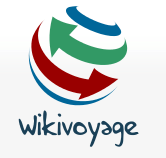Skift Take
There is no question about it: guidebook publishers should fear Wikivoyage, but travelers should rejoice. Though give it some time to build up into a useful resource.
» Get your daily dose of Skift: subscribe to our newsletter, RSS, Twitter or Facebook.
[UPDATE: The Wikimedia Foundation is tentatively slated to launch Wikivoyage next week, on January 15, Skift has learned.]
Wikipedia’s next big push is a travel wiki, and the official launch of Wikivoyage is coming soon, according to Wikipedia founder Jimmy Wales.
Wales was on Colbert Show last night talking about next big priorities for the organization, and he mentioned that Wikipedia’s travel effort, called Wikivoyage, is soon launching officially after being developed as a project for the last 5-6 months. The site has been live since late September but still as a project-in-development, not a fully-baked site.

From the show: “We have a travel site that’s opening up soon, we will see how it goes…called Wikivoyage.” Asked by Colbert if they would consider having a business model for the travel site, he flatly said, as he always has: “No.” Meaning no to any commercial considerations, or advertising, which is the same policy for the main Wikipedia site as well. The clip below:
The Wikimedia Foundation, parent of Wikipedia, agreed to host and support the new global travel wiki, despite opposition, including a lawsuit against volunteers, from Internet Brands, which owns rival Wikitravel. We’ve covered all of this in gory detail in past.
Since the early launch of the project in September, its vision has come along, and now spells out more clearly what its goals and “non-goals” are. These are helpful as guideposts to the already-hammered travel guidebook publishers and startups looking at this new giant free project as a threat to their existence. Some of these goals and non-goals are a bit odd as worded, but that’s possibly due to something lost in translation in this global, still-in-the-works project.
From the list, the goals:
Wikivoyage articles should be useful for at least the following purposes:
- For on-line use by travellers on the road, huddled in a late-night Internet café in some dark jungle, who need up-to-the-minute information on lodging, transportation, food, nightlife, and other necessities;
- For off-line use by travellers on the road sitting in a train with a subset of Wikivoyage on their PDA, laptop, mobile phone, iPod or digital camera.
- For on-line use by travellers still planning to review destinations, plan itineraries, make reservations, and get excited about their trip;
- For individual article printouts, that is, for printing a list of museums or karaoke bars and putting it in your back pocket for when you need it – or making a photocopy when someone else does;
- For ad-hoc travel guides, small fit-to-purpose travel books that match a particular itinerary;
- For inclusion in other travel books, giving up-to-date information for travel guide publishers.
As for what not to expect, the list is a bit stranger. Read for yourself and decipher (excerpts, full list here):
These are some specific non-goals; things people might think we want to do with Wikivoyage, but we don’t:
- Create a travel essay anthology. Wikivoyage is not a travel magazine. Articles should be directed toward practical information about travelling.
- Create a travel chat board. Wikivoyage has talk pages for each article, but these should be used to develop the article itself, and not as a “comments” area. Anyone can edit a Wikivoyage article; if you have useful information about a topic, put it in the article itself.
- Make an advertising brochure. Wikivoyage of course has listings and information about travel-related businesses around the world. We would be thrilled to have representatives of these businesses keep those records up-to-date. However, blatant advertising is not welcome, and overcompetitive acts (like deleting information about rival businesses) is gravely deprecated.
- Produce a Yellow Pages of restaurants, hotels, or bars for a city. City guides should certainly include information for travel-related companies, but these should be kept at a useful number. Think of a friend from out of town asking you where they should go – you wouldn’t list all 200 possibilities, but 5–10 options for a particular type, budget, or part of town.
- Build a Web directory. Wikivoyage articles should not have in-article links to external resources, with the exception of a link to the official website besides the name of a listing. It’s not a goal to collect links about any destination. External links should support and complement the content of articles; they’re not a goal in and of themselves.
- Make a travel guide supplement. The Wiki technique we use for Wikivoyage makes it possible for us to include information that’s not in other travel guides. This doesn’t mean that we only include information not found in other guides. Wikivoyage aims to be a complete travel guide – not just an additional resource on the side of traditional guides.
- Make an encyclopedia. Wikivoyage aims to tell people how to travel all over the world, not document everything there is on the planet or how it ended up that way. If you find yourself needing references and footnotes on Wikivoyage, whatever you’re writing should probably go to Wikipedia instead.
- Run a travel agency. Wikivoyage does not arrange visas, make bookings for airlines, car rentals, cruise lines, hotels, railways, or package tours.
» Get your daily dose of Skift: subscribe to our newsletter, RSS, Twitter or Facebook.
The Daily Newsletter
Our daily coverage of the global travel industry. Written by editors and analysts from across Skift’s brands.
Have a confidential tip for Skift? Get in touch
Tags: guidebooks, guides, wiki
